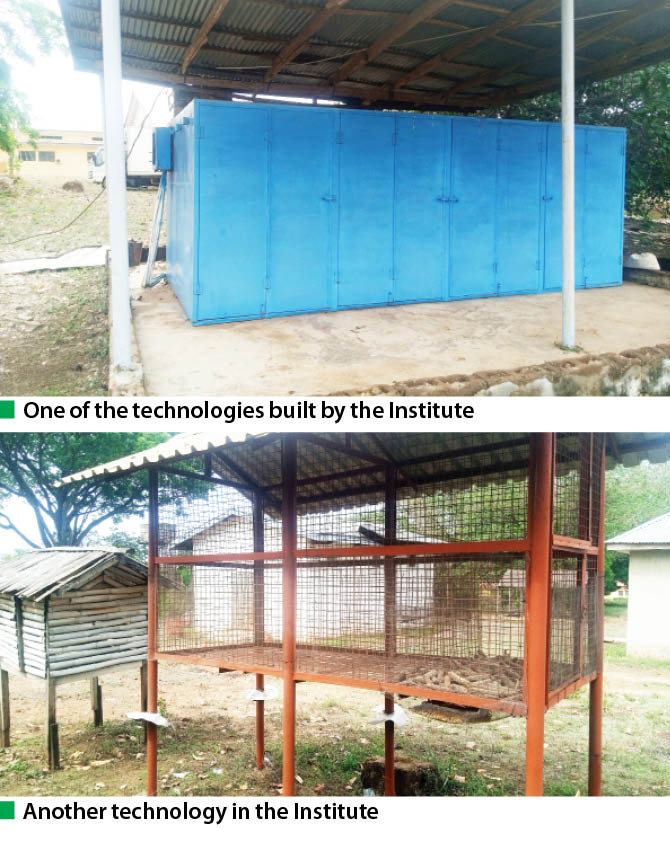One of the major problems farmers have to contend with in the country is how to deal with postharvest loses, which experts estimate is up to 45 per cent for some crops like vegetables.
In an attempt to deal with this problem, the federal government established the Nigerian Stored Products Research Institute (NSPRI) located in Ilorin Kwara State.
- 5 killed, 20 abducted in fresh attack on Plateau village
- Sex education is the parents’ responsibility, not the media
The institute, which focuses on post-harvest and conducting research to develop technologies that will solve farmers’ problems, has so far developed a number of technologies that could help farmers solve their postharvest problems.
Daily Trust visited the institute recently.
The Director, Research Operations of NSPRI, Dr Adeola Olufemi Oyebanji, who spoke on behalf of the Executive Director, Dr Patricia Pessu, said the institute has recorded some modest achievements on how it has used postharvest technologies to reduce postharvest waste in the country.
Technologies
According to him, “NSPRI is one of the research institutes in Nigeria specifically mandated to attend to development components of agriculture towards avoiding postharvest loss as well as maintenance of quality and safety of all agricultural crops.
“For the cereals and beverage crops, our flagship is the inner atmosphere metal silos. We also have the ventilated cribs; improved warehouse and hermetic containers among others. Under the root and tubers, we have improved yam barn unlike the traditional approach to storage and have also added value to the roots tubers to get elubo, poundo yam flour, garri and other products of cassava and ensure they are in good quality and safety for consumption and storage.
“For our fruits and vegetables which are perishable by their nature in their fresh forms, we have intervened by providing ventilated stackable crates that ensure the quality of the fruits is retained at the end of transportation. We also have various cooling facilities like the ECS Evaporative Plant System which was developed from our local pot cooling system to create a cool environment for keeping our fresh produce especially fruits and vegetables.
“In the limit of storability of the fresh form, we also harness dry storage and developed improved dryers ranging from solar trays, solar tents, parabolic shaped solar dryers and multi crop dryers. There is the smoking kiln for our livestock and fisheries which is an improvement on our traditional product. All these we have done in our research and development activity to impact the system,” he added.
He said the institute goes further to get the information to stakeholders like farmers, processors and exporters, adding that “During such process, we understand their challenges and how we can leverage our position to respond through trainings and promotions of our various technologies as well as encourage their adoptions.
Impact
Oyebanji said while more research is needed to fully understand the extent of how the technologies have impacted on the sector, “contribution of these technologies has saved potential for loss of grains of about 30 per cent, root and tubers over 50 per cent and more than 80 per cent for fruit and vegetables.
“Overall, we have impacted the system up to 30 per cent reduction from 3 per cent that we have and this is quite huge. But it could have been more save for access to these technologies which is constrained to the manifestation of the impact we are supposed to be making due to our system as a developing country. These run into several millions of dollars.”
Affordability
He said they have technologies in different model and capacities, adding that “charcoal powered 25kg fish smoking kiln (C Type) last year was sold for around N159,000 while the gas powered was around N164,000. The electric powered was N169,000. But the 100kg smoking kiln charcoal powered is N328,000 and N336,000 for the gas powered while the electric powered one is sold N348,000. They can all be expanded depending on the requirements. We develop our technologies in consideration of those who would use them. By our situation, we still have to support our people which we are doing through distribution as we get along. There is the need for them to come together to increase their capacity to access our technologies on their own and some of them can learn and develop it themselves with access to the local materials like the ventilated cribs. But these things are not expensive when you look at the life of the facilities and benefits over time.”
Benefits
According to him, “What we tried to achieve with the smoking fish kiln was to retain the flavor associated with preference for smoked fish. In the process, we have the moisture reduction to make sure there is control for microbial growth on the product and then dry under very clean condition to ensure we control insect infestation.
“For the ventilated plastic crates used for food transportation, the damages they may have incurred due to compression when they are bagged will be avoided. For the improved yam barn, the design and construction facility is made to provide a cool atmosphere in spite of the warm climate we have by correct selection of materials for design and construction that now extend the life of the stored product. For other crops that are susceptible to shrinking, we have developed edible coatings that help to reduce dehydration and extend the shelf life like coated oranges. When such oranges are stored in our evaporative coolant system, it can last for over three months in very good condition different from what you can experience within 10 days ordinarily among others. But we are also innovating and more are still going to come. Our driers are made to ensure that clean drying is achieved different from drying in the open. We started that from the solar tray and we have innovated to bigger capacity and increasing the efficiency on moisture reduction and hermetic containers like the metal drums that we recently distributed.
Challenges
Dr Oyebanji identified funds as one of the institute’s majorly challenge, adding that there is need for more laboratories. “While we can say there is room for a lot of improvement, we will appreciate the government for sustaining us till now. We are trying to upgrade our facilities
Advice
He said “The institute will continue to be relevant and has done a lot in the training but there is still the need to innovate on what is on ground and continue to work in promotion and encouragement of the adoption of its technologies by farmers and exporter to help them benefit from the situation.”

 Join Daily Trust WhatsApp Community For Quick Access To News and Happenings Around You.
Join Daily Trust WhatsApp Community For Quick Access To News and Happenings Around You.


